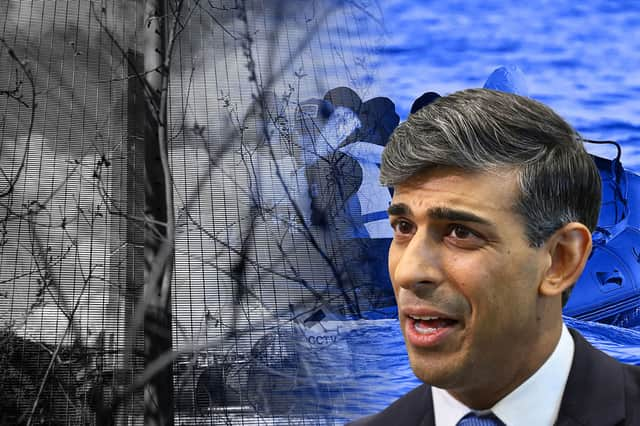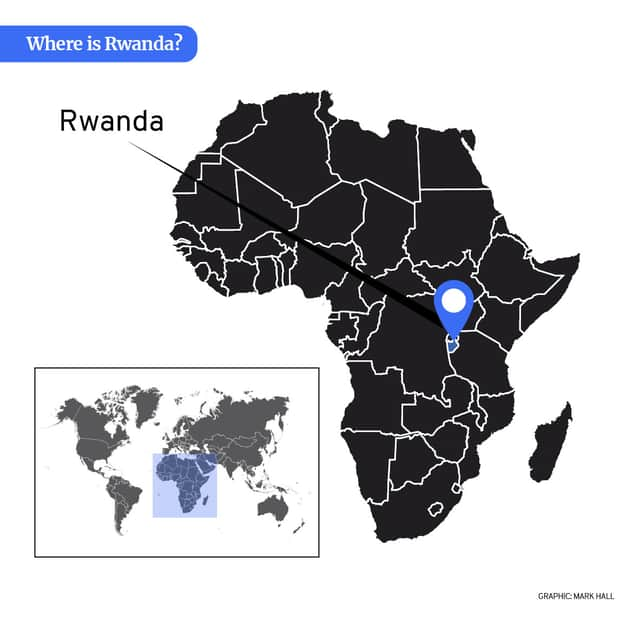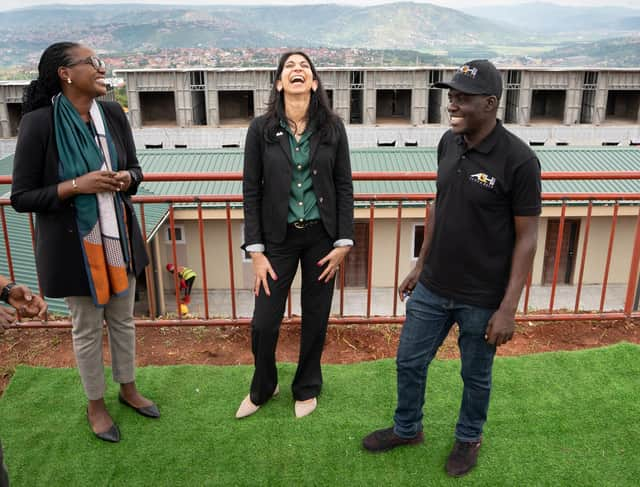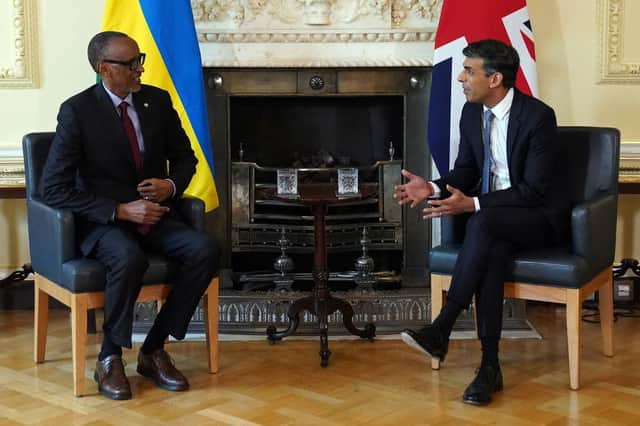What is the UK Rwanda Bill? Why does Sunak want to send asylum seekers there, is it safe, costs explained
and live on Freeview channel 276
Rishi Sunak has finally passed his Safety of Rwanda Bill through Parliament, after making MPs and peers sit into the early hours.
The legislation is expected to get Royal Assent this week, and the Prime Minister has said he is wants to get flights off the ground in July. The government believes that by sending asylum seekers to Africa for processing and resettlement, this will deter migrants from crossing the Channel in small boats.
Advertisement
Hide AdAdvertisement
Hide AdSunak said: “The passing of this landmark legislation is not just a step forward but a fundamental change in the global equation on migration.
“We introduced the Rwanda Bill to deter vulnerable migrants from making perilous crossings and break the business model of the criminal gangs who exploit them. The passing of this legislation will allow us to do that and make it very clear that if you come here illegally, you will not be able to stay. Our focus is to now get flights off the ground, and I am clear that nothing will stand in our way of doing that and saving lives.”
However charities and NGOs have argued this is ineffective, while Labour says the bill is a complete waste of money. But what is the Rwanda bill, why has the government chosen the east African country and is it safe? Here's everything you need to know.
What is the Rwanda Safety Bill?
The government wants to send asylum seekers to Rwanda for processing and resettlement, in what has become Sunak's flagship piece of legislation. The Home Office believes this will act as a deterrent to migrants crossing the Channel on small boats, however charities have questioned whether this will work.
Advertisement
Hide AdAdvertisement
Hide AdThe policy, however, was originally declared unlawful by the Supreme Court as it puts asylum seekers at risk of "refoulement", which is when they are sent back to their home country where they are at risk. Sunak hopes to combat this with a twin approach, firstly, signing a treaty with Rwanda which states that anyone the UK sends cannot be deported from east African country.
The second part is this bill, which unilaterally declares Rwanda safe for asylum seekers who arrive on small boats, and disapplies parts of the Human Rights Act to limit the number of legal challenges that migrants can make. The government says that individuals can only legally contest their deportation if they can prove they would face serious and irreversible harm - such as being pregnant or suffering from a very serious illness.


This part is particularly controversial as it effectively disapplies UK and international law. What this means is that if an asylum seeker makes a legal challenge and cites the European Convention on Human Rights, a government minister will decide whether to deport them and can ignore the ECHR. It will also mean that refugees will not be able to cite certain sections of the Human Rights Act, when arguing that being flown to Rwanda is unlawful.
The Rwanda plan was first concocted by Boris Johnson in 2022, and since then three Home Secretaries - Priti Patel, Suella Braverman and James Cleverly - have visited Kigali, yet no flights have taken off. Sunak has effectively bet his premiership on the policy, facing down rebels within his own party such as the former Immigration Minister Robert Jenrick. He is desperate to get some asylum seekers to Rwanda ahead of the general election, so he can present himself as tough on immigration.
Advertisement
Hide AdAdvertisement
Hide AdWhy Rwanda?
The government hopes that by sending asylum seekers to Rwanda, it will deter small boat crossings across the Channel. The idea is that if refugees knew they were going to be deported to the east African country, they would not making the treacherous journey.
While the number of people crossing in small boats dropped by a third from 2022 to 2023, this March had the highest number of migrants arriving in that month since records began. So far this year there have been more than 6,200 arrivals.
The Home Office had to find a country that would both act as a deterrent, be considered safe and accept asylum seekers from the UK. The government believes that Rwanda ticks the boxes, however the Supreme Court ruled this as unlawful due to specific issues with the east African country and its justice system.
Charities such as the British Red Cross have refuted the Home Office’s claims that the policy will succeed in stopping Channel crossings, arguing that “deterrence policies don’t work and will never solve the asylum seeker crisis”.
Advertisement
Hide AdAdvertisement
Hide Ad

Is Rwanda safe?
The government has consistently claimed that Rwanda is safe for refugees. Home Secretary James Cleverly said: “We are clear that Rwanda is a safe country, and we are working at pace to move forward with this partnership to stop the boats and save lives. Rwanda cares deeply about the rights of refugees, and I look forward to meeting with counterparts to sign this agreement and further discuss how we work together to tackle the global challenge of illegal migration.”
Previously, former Home Secretary Suella Braverman visited Rwanda and joked about the houses that had been built for asylum seekers: “These houses are really beautiful, great quality, really welcoming, and I really like your interior designer. I need some advice for myself.” Government sources have also made the point that the UNHCR, the UN's refugee agency, which gave evidence to the Supreme Court criticising Sunak's plan, has sent asylum seekers from Libya to Rwanda.


However, despite representations from the Home Office, the Supreme Court ruled against the plan. The five justices - who form the highest court in the land - said they were concerned that genuine asylum seekers were at risk of being returned to their home countries, where they would potentially be in danger, which is known as “refoulement”. The Supreme Court said this was unlawful under several international treaties that the UK has signed, and also goes against domestic law.
A key part of the evidence came from the UNHCR, which found that Israel had entered a similar agreement with Rwanda, and "asylum seekers were routinely moved to a neighbouring country where they were likely to be refouled".
Advertisement
Hide AdAdvertisement
Hide AdIn their ruling, which the other justices agreed with, Lords Reed and Lloyd-Jones said: "The central issue in the present case is therefore not the good faith of the government of Rwanda at the political level, but its practical ability to fulfil its assurances, at least in the short term, in the light of the present deficiencies of the Rwandan asylum system.”
The Supreme Court justices later said there was “evidence of a culture within Rwanda of, at best, inadequate understanding of Rwanda’s obligations under the Refugee Convention”. Rwanda is also effectively a dictatorship, with the ruling party in place since the genocide in 1994. Paul Kagame has been President since 2000. A report by Human Rights Watch in 2021 found that "it is not unusual for Rwandan journalists to go missing, or end up dead in mysterious circumstances".


When asked by NationalWorld, the Prime Minister's spokesman did not deny Rwanda could be called a dictatorship. He said: "Rwanda is a safe country, a vital partner to the UK even beyond the migration partnership. It's not just the UK that works with them [Rwanda] but the UNHCR too."
The US Department of State, the equivalent of the Foreign Office, condemned Rwanda earlier this year for funding the M23 rebel group, which is carrying out armed attacks in eastern Democratic Republic of Congo. It called on Rwanda to withdraw its military personnel and weapons systems from the DRC, saying they threatened the lives of civilians, UN officials and other peacekeepers. Kigali denies supporting the rebels.
Advertisement
Hide AdAdvertisement
Hide AdWhen will flights start going to Rwanda?
Rishi Sunak has estimated that it will take 10 to 12 weeks to get flights off the ground. This is to allow time for individual legal challenges from asylum seekers to be concluded. Therefore, if all goes to plan for the Prime Minister, he could start deporting migrants in July.
He said in a speech on 22 April: “Once the processing is complete, we will physically remove people. To do that, I can confirm that we’ve put an airfield on standby booked commercial charter planes for specific slots and we have 500 highly trained individuals ready to escort illegal migrants all the way to Rwanda, with 300 more trained in the coming weeks.
“This is one of the most complex operational endeavours the Home Office has carried out. But we are ready. Plans are in place. And these flights will go come what may.”
How much will the Rwanda plan cost?
The government has made a number of payments already to Rwanda, with more being in the pipeline - and the initial outlay could reach around £500million. The first payment, which had already been reported on, from 2022-23 was of a total of £140 million paid to Rwanda - which was made of £120 million through an Economic Transformation and Integration Fund and a separate payment of £20 million to set up infrastructure for any asylum seekers sent there.
Advertisement
Hide AdAdvertisement
Hide AdHome Office permanent secretary Matthew Rycroft revealed that in April 2023, at the start of a financial year, a further payment of £100 million was made to Rwanda. He said that in the 2024-25 financial year, so presumably next month, there will be a further payment of £50 million. The NAO has said that the up front payments will reach £370million over a five-year period.
On top of this, if 300 asylum seekers are sent to Rwanda, the government has pledged a further £120million, and on top of that £150,000 will be paid per individual. There will then be an additional payment of £20,000 to help migrants get settled in the east African country.
The IPPR has estimated that if all 20,000 people who have arrived in the UK by irregular means, including on small boats, since the Illegal Migration Act came into force, were moved to Rwanda, it would cost overall between £1.1billion and £3.9billion. The think tank says the higher figure accounts if all migrants stay in the east African country for five years.
The taxpayer could be spending £230,000 per person sent to Rwanda, compared with £55,000 each if they remained in the UK, the IPPR says. Marley Morris, IPPR associate director for migration, trade and communities, said: “Aside from the ethical, legal and practical objections, the Rwanda scheme is exceptionally poor value for money.
Advertisement
Hide AdAdvertisement
Hide Ad"For it to break even, it will need to show a strong deterrent effect, for which there is no compelling evidence. Under the government’s plans, billions could be sent to Rwanda to remove people who have already arrived irregularly since the Illegal Migration Act was passed. The only winner from this scheme appears to be the Rwandan government itself, which has already secured hundreds of millions without doing much at all.”
Ralph Blackburn is NationalWorld’s politics editor based in Westminster, where he gets special access to Parliament, MPs and government briefings. If you liked this article you can follow Ralph on X (Twitter) here and sign up to his free weekly newsletter Politics Uncovered, which brings you the latest analysis and gossip from Westminster every Sunday morning.
Comment Guidelines
National World encourages reader discussion on our stories. User feedback, insights and back-and-forth exchanges add a rich layer of context to reporting. Please review our Community Guidelines before commenting.
